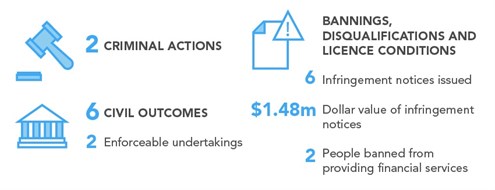Financial markets fund the economy and, in turn, economic growth. But they can't do this without the trust and confidence of investors.
ASIC’s Market Integrity Group focuses on investor trust and confidence through its work to ensure Australia’s financial markets are fair and efficient. We set standards and education, pursue behavioural change and take enforcement action to deter market misconduct.

This report highlights some of the activities we undertook between 1 July and 31 December 2016, and outlines our priorities for 2017.
 Standards and education
Standards and education
The Market Integrity Group looks closely at the effect of different behaviours on our markets. Our observations inform the standards we set and how we educate our stakeholders.
ASX outage
The standards we set are designed to make sure that retail and wholesale markets are characterised by reliable and effective price discovery and robust and efficient post-trade systems.
Well-functioning financial market infrastructure is critical to the integrity and reputation of the Australian equity market and the trust and confidence investors have in it. In December 2016 we published the findings of our review of the ASX outage that affected the operation of the Australian equity market on 19 September 2016.
Our review provided a whole-of-market perspective and highlighted the fact that – despite considerable market developments in Australia in recent years – ASX's trading system is still a single point of failure in our equities markets.
The review identified areas of ASX’s business that could be enhanced to manage technological risks going forward, including:
- business continuity and IT disaster recovery
- comprehensive and robust technology status monitoring, and
- key enterprise architecture documentation.
The report also made a number of recommendations for market participants designed to improve the resilience and robustness of the wider market and to promote confidence that any future incidents will be managed effectively.
We will be undertaking a wider review of the operational and technological risk management arrangements across ASX Group later this year.
Licence conditions
We also concentrate on improving the compliance standards of our market participants. Market participants are important gatekeepers to our financial markets and must have effective risk management and internal supervision.
Anyone who provides direct market access to clients should maintain appropriate controls to ensure that trading messages do not interfere with the integrity of the market. These controls include appropriate filters and a robust trade monitoring framework.
In December 2016 we imposed additional conditions on the Australian financial services (AFS) licences of OpenMarkets Australia Limited (OpenMarkets) after we identified concerns with its:
- arrangements for identifying and preventing potential market misconduct
- reconciliation of its client trust accounts, and
- supervisory arrangements and organisational and technological resourcing.
The conditions require OpenMarkets to appoint an independent expert to review the organisation’s arrangements, identify any deficiencies, and recommend enhancements appropriate to the business.
See also, ASIC imposes licence conditions on Morgans Financial Limited.
Confidential information and conflicts of interest
In August 2016 we reported on our review of the handling of confidential information and conflicts of interest by market participants, see Report 486 Sell-side research and corporate advisory: Confidential information and conflicts. As part of the review, we looked at the policies, procedures and practices of a range of investment banks and brokers and reviewed a sample of transactions, including initial public offerings and secondary offerings.
While we found that most have appropriate procedures and policies to handle confidential information, there were variations in market practices.
Following the publication of our findings, we provided individual feedback to participants involved in the review setting out a number of recommendations aimed at improving standards and educating participants about their regulatory obligations.
In response to the feedback we provided, some participants made a range of changes to their practices, including:
- establishing policies for handling confidential information
- reviewing and updating conflict management arrangements (including updating staff training)
- physically segregating research staff from staff involved in a sales function, and
- revising and improving the staff trading process.
 Behavioural change
Behavioural change
Achieving behavioural change is an important part of our work. Through early intervention, we may be able to prevent risky conduct, potential breaches and investor losses, before they occur.
Systems and controls
Market participants should operate with a culture and conduct risk framework that supports the integrity of Australia’s retail and wholesale markets. Having appropriate systems and controls is integral to making sure this happens.
Late last year we accepted enforceable undertakings (EUs) from National Australia Bank Limited (NAB) and the Commonwealth Bank of Australia (CBA) to address gaps in their wholesale spot foreign exchange businesses.
The EUs followed an investigation of the activities of these businesses between 1 January 2008 and 30 June 2013. We were concerned that, during this period, both banks’ systems and controls may not have been adequate to address risks of specific inappropriate conduct identified by ASIC.
We are committed to making sure major financial institutions have effective mechanisms in place to ensure their employees are trained, monitored and supervised to provide financial services efficiently, honestly and fairly.
NAB and CBA also made community benefit payments of $2.5 million each towards advancing financial literacy education for the aged care sector.
Cleaning up our markets from information leaks
In August last year we published research that found there has been a sustained improvement in the 'cleanliness' of Australia's listed equity market over the past decade.
Market cleanliness measures market integrity with a focus on possible insider trading and information leakage ahead of material, price-sensitive announcements by analysing price movements or shifts in trading behaviour before these announcements.
The results suggest the extent of insider information and the loss of confidentiality ahead of material announcements has declined over the past 10 years.
While our research shows that our markets are in good shape, there is no room for complacency. Preserving the integrity and reputation of Australia's financial markets by encouraging behavioural change is a critical priority for ASIC.
In Report 486, we asked firms to carefully consider their handling of confidential information and conflicts to ensure they are managing the risk of insider trading. We also asked them to look at whether their controls are appropriate and whether the culture at their firm supports conduct that enhances market integrity.
 Deterrence
Deterrence
Deterrence is one of the key drivers of individual and firm behaviour among our regulated population.
Most people who manipulate the market do so for individual gain – to increase the value of their own or their clients' investment, to earn a bigger bonus, or to promote their reputation or career. We take enforcement action to make sure misconduct is dealt with and deterred.
Insider trading
Insider trading is a serious threat to market integrity. Markets can only operate fairly when information is accurate and available to all. Leaks of information create false markets and harm investors' trust and confidence, discouraging participation. When we see this type of market misconduct, we will act.
In December German construction company Hochtief AG paid a civil penalty of $400,000 for insider trading and ordered by the courts to pay ASIC's costs.
The matter was launched by ASIC after Hochtief Australia, a subsidiary of Hochtief AG, acquired shares in Leighton Holdings (now CIMIC Group).
Hochtief AG had given agents instructions to buy a large parcel of Leighton's shares for Hochtief Australia. In January 2014 it varied those instructions by pushing out the last day to buy the shares from 31 January to 14 February. At the time it did that, Hochtief AG was in possession of inside information – in this case, Leighton's expected financial result for 2013. This amounted to insider trading and, by the time we commenced proceedings, Hochtief AG had admitted to the contravention.
This was our first successful insider trading action against a multinational corporation, and shows our commitment to addressing market misconduct regardless of where it occurs or who is responsible.
See also, Sydney man convicted after pleading guilty to insider trading.
MDP
In August Mr Simon Gray became the new Chairman of the Markets Disciplinary Panel (MDP). The MDP is a peer-review body that exercises ASIC’s power to issue infringement notices or accept enforceable undertakings for alleged breaches of the ASIC market integrity rules.
Mr Gray is Deputy CEO of Shaw and Partners and was the Deputy Chairman of the MDP. He is also a member of the ASIC Markets Advisory Panel and the ASX Appeal Tribunal.
Between July and December 2016, the MDP issued five infringement notices imposing total penalties of $1.44 million.
For example, in September 2016 Commonwealth Securities Limited (CommSec) paid a penalty of $700,000 to comply with two infringement notices and voluntarily refunded $1.1 million in brokerage to more than 25,000 clients.
In November we also commenced civil penalty proceedings against State One Stockbroking Ltd (State One) for failing to comply with a $425,000 infringement notice given to it by the MDP. Between August 2010 and December 2016, the MDP issued 51 infringement notices in relation to alleged contraventions of the market integrity rules. All of these have been complied with except for the notice issued to State One.
Note: In addition to the MDP outcomes, we also issued a continuous disclosure infringement notice in September 2016.
What else?
In September 2016 Australian market licensee, Yieldbroker Pty Limited (Yieldbroker), became the first non-US swap trading facility in the world to be allowed to offer direct access to US participants without having to register as a swap execution facility with the US Commodity Futures Trading Commission.
As well as the significant benefits to Yieldbroker and the Australian swaps market, this is an important step in cross-border regulatory coordination. This development highlights our ongoing efforts to support Australian entities seeking regulatory recognition in foreign markets.
What's next?
We will focus on the following existing and emerging risks over 2017:
- Firm culture and conduct risk: Conduct risk can be caused by deliberate actions, or by inadequacies in a participant’s practices, frameworks or staff. Over the next year, we are building on the cultural indicators in our risk-based surveillances and using our findings to better understand how culture is driving conduct. Where we think there may be a problem, we will ask questions and dig deeper.
- Handling of confidential information and conflicts of interest: Following Report 486, we plan to publish guidance on sell-side research conflicts. The proposed guidance will set out our expectations of how financial intermediaries should handle material, non-public information and manage conflicts of interest in the provision of research.
- Technology risk and cyber resilience: We will be reviewing the technological and operational risk management of our stakeholders, focusing on critical infrastructure providers. As part of this work we will continue to collate and analyse cyber resilience information from our regulated population and engage with other government agencies and industry bodies to improve cyber resilience across our financial markets.
- Market innovation: Over the next six months we will be focusing on building the resilience of our markets’ systems and controls to ensure that technological developments take place in an environment that supports investor trust and confidence.
For regular updates on the work ASIC's Market Integrity Group is doing, subscribe to our monthly e-newsletter!
